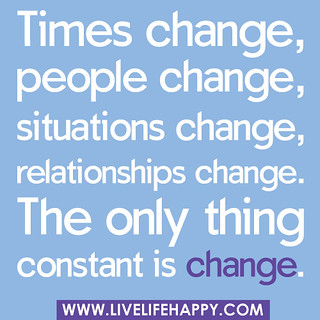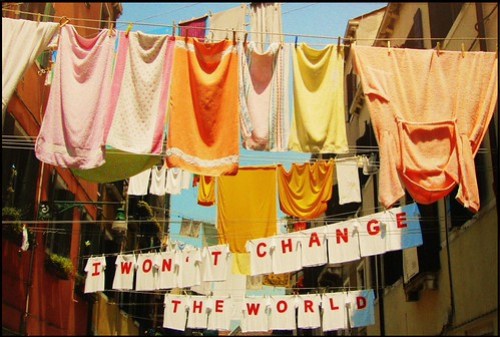So once again under one of those should I be talking about BBC (work) on my personal blog type questions. I can't help but talk about the things which happened yesterday (Tuesday 25th April) at the BBC. The Guardian calls it a radical revamp of the site, but internally it was known as the Creative future or how the BBC is going to address the challenges of the on demand world? It seemed to be pushed as a launch but actually it was more like just a event to publise audience research and the thinking which has gone into how we should be moving forward. I have no problem with this, but I can see how people got confused or even frustrated with the lack of a solid plan. Not that I'm saying there is no plan.
In my mind, it seemed to be saying, we know were going in this direction but we honestly do not know what the future holds, so we need to be very flexable to changes. I'm sure the Cluetrain something like this too.To me itts the BBC way of saying change is the only constant. There also seems to be a true commitment to onlline as our future and the push to open up the BBC is being taken very seriously now. Metadata was also mention highly and I'm really happy this has been communicated from high. Now this makes metadata authoring a even more valuable piece of time in our journalistic practice. I picked up on this quote from Mark Thompson and wrote it down.
The BBC should no longer think of itself as a public broadcaster of TV and radio and some newmedia on the side. We should aim to deliver public service content to our audiences in what ever media and on whatever device makes sense for them
On a different but actually realted topic, the we media conference rolls into London for the first time in May. The conference attracts people from all the leading online publishing houses including the new york times, washington post, bbc, retuers, etc. Its a high cost ticket affair which someone like myself couldn't even imagine affording on my current BBC salary. But I do have the chance to spend the afternoon with some of these publishing heads in a session called meet the digital assassins.
As part of this session I have been asked to document a week worth of media consumption. So far this is what I've drafted
The first thing I do when getting up in the mornings, is play the daily 15min podcast Slashdot review. This usually lasts the time i'm in the shower and gives me a great overview of what's going on. I'm using a simple FM transmitter on my workstation which means I simply have a cheap shower radio tuned in on the right frequency.
In the hour it takes to get ready and eat breakfast, etc. I tend to leave iTunes playing in most recently added order. Like the cheap shower radio, the radio downstairs in the kitchen also plays whatever iTunes is playing. I've never known a time when I've switched over to a Traditional radio station in the morning or evening.
My home workstation automaticly downloads, podcasts, video, everything. It then syncs the latest content with my laptop and I manually copy stuff to my mobile phone's flash card.
Every work day on the train for my 30min journey from Woolwich to Charing Cross, I have my laptop out reading through my general news and blogs category in my RSS reader (GreatNews). I mark anything which needs more of my attention “to be read later” or “to be read sometime in the future.” Recently I've been blogging on the train more than reading.
At the same time, during the in total hour journey, I have my mobile phone playing podcasts or once in a while video content if I have to take the tube to White City.
During lunch times I turn to my laptop and either blog, read more news from all the other categories or watch one of the main videocasts which are freely available. These include Rocketboom, MobuzzTV, DLTV, Diggnation, etc.
I find my offline social network usually fills me in on anything I've missed, and I can usually catch up by downloading it the day after. The only newspaper type thing I pick up and flick through is the Ariel (internal BBC paper) while making Tea.
The train ride home gives me equal time to read through feeds and I usually try and go a little later so I can get a seat and sit with my laptop on my lap and read. If not I have a RSS reader on my pocketpc and mobile phone. But I miss being able to tag content/entries with these devices.
When at home, me and my wife usually settle down and watch something via our modified xbox while eating dinner. The content viewed is a real mixture of publicly available video, downloads of states programmes and globally available content from the web. It all comes to me over my broadband connection, and is the reason why I don't own a PVR or DVR.
UK nova is well known about and I guess highly watched by UK broadcasters but the service they provide is simply fantastic and fits with the way I and my wife consume and engage with video content.
The video content is a real mix of mainstream content like Lost, Daily Show, Simpsons, etc, and content from the net (such as Hak.5, CommandN, etc) mixed in. We tend to just pick and choose depending on our moods.
On the weekends, if were in and doing things around the house. We tend to stick on a playlist of podcasts. My Subscriptions includes the simply amazing IT Conversations, Engadget, Security now, This week in Tech, Digital Planet, etc.
And I guess, thats my usual week.
Pretty weird to some I guess, but thats pretty much my week.
Comments [Comments]
Trackbacks [0]







